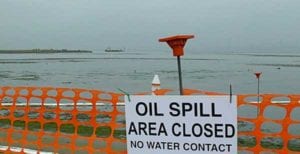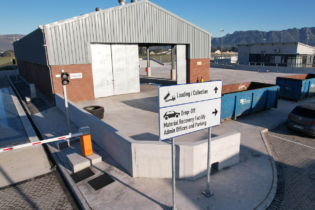South Africa’s economy, tourism and local businesses would take a massive beating if we were to suffer a major oil disaster along any of our coastlines, and South Africa’s already overburdened tax payers would end up footing the bill for salvage and cleanup costs. The long term cleanup and reparation process could spell the end of coastal tourism for years to come, not to mention the horrifying impact on our fragile coastal wildlife and ecosystem.
This is according to Andrew Aubin, regional general manager: Eastern Cape for Aon South Africa. His warnings follow a shocking report aired on Carte Blanche (17 June: All at Sea) regarding the state of SA’s readiness in the event of a major oil disaster in our seas. “Despite the fact that three of the biggest oil spill disasters in maritime history took place off South Africa’s coastline, authorities are failing to monitor the changing shipping environment and modify behaviour accordingly. They seem to have chosen a laissez faire approach to insurance covers, crisis management and response capacity when it comes to monitoring ships, particularly oil tankers in South African waters,” warns Aubin. The Carte Blanche expose revealed that at most South Africa would be able to recover R180 million from traditional insurance markets in the event of a disastrous oil spill. The truth is that because South Africa has not updated its legislation for the past 12 years, local oil companies aren’t paying the 3c on every ton of the oil they import to the International Fund, the insurance fund to which the world’s major oil companies contribute. And, like all insurance premiums, if we don’t pay our levies we can’t claim. When one considers that clean-up costs for the Erica and the Prestige have been between R6 and R7 billion and the most expensive was the Exxon Valdes at R23 billion, ordinary tax-paying South Africa citizens would end up footing the bill if the unimaginable happened. And South Africa is nowhere near any reasonable level of readiness to handle such as a disaster. “The reality is that the Kuswag fleet, our very first line of defence in dedicated pollution control when it comes to sea traffic and oil vessels, has been lying idle in the Simons Town harbour since March this yearas a result of bureaucratic inaction. This means that South African waters are poorly monitored and policed when it comes to pollution management and we are sitting ducks for a major natural disaster. We simply cannot sit back and naively think that the ships using our waters are properly insured, if at all, or are in a reasonable state of repair and maintenance. The truth is that many of these ships come from very questionable origins with owners who have little regard for the law or the implications for anyone else of their wrong doing,” he says. And it’s not just oil tankers that pose a major environmental threat. “Any ship has very large volumes of oil and fuel on board. The EihatsuMaru, although only a small long-line fishing vessel could have caused serious damage had the ship broken up after it ran aground off Clifton Beach in May. Fuel and oil are carried in significant volumes on ships and secondly, we also know that ships are illegally flushing their bilge tanks at sea, leaving large slicks of oil in their wake. “We have had a number of very near hits recently. In fact, as little as a few days ago, South Africa’s Eastern Cape was saved from a potentially devastating oil slick threatening to hit the coastline. A South African coastguard aircraft spotted and photographed a foreign container ship trailing a long oil slick off the Eastern Cape coast. The Conti Hong Kong was spotted discharging oil from its bilges just 14 nautical miles off Hamburg, south of East London. The slick was four nautical miles long and 50 metres wide at the time it was spotted. And South African maritime authorities were powerless to act against the vessel because there was zero response capability. It is understood the Conti Hong Kong was westbound for Lagos in Nigeria, having sailed from Colombo in Sri Lanka,” says a concerned Aubin. A turn in weather conditions pushed the slick back out to deeper waters. According to the South African Maritime Safety Authority (SAMSA), of the nine most recent shipping incidents, seven ran into serious insurance challenges. In the salvage of the EihatsuMaru, authorities face a salvage cost of R7.5 million and with more legal costs to come. The ship also isn’t insured and SAMSA’s hopes of selling the ship and its contents to foot the bill won’t even cover a third of the costs. Now the battle will go to courts and South African tax payers are left holding the can.“The reality is that the volume of freight and cargo being transported by sea has been on a rapid climb as air freight costs are more expensive. The result is more and more ships at sea with questionable credentials and even more questionable adherence to safety and maintenance processes. There is an influx of sub-standard ships entering our waters and because many of them don’t enter our harbours, the first time authorities will know whether they have the requisite insurance covers in place is when they run into trouble on one of our beaches. “The insurance and financial implications of such scenarios are far-reaching, not to mention for the cargo owner whose goods are sitting adrift at sea, and finally, the government left to clean up the mess. And even if the ship is put under arrest and sold on public auction, the chances of it fetching sums even remotely sufficient to cover the costs of salvage and environmental reparations in the event of a spill are remote to zero. South Africa’s last oil spill saw a R52 million clean-up bill to save the penguins and bird life alone.
“The only means of preparing for a disaster of such gravitas would be through properly scoped insurance and legislation, but this has also been in limbo for over 12 years now,” explains Andrew. “If there was a cataclysmic oil spill right now we would be are seriously compromised as we could not claim from the International Fund since our oil companies are not contributing to it. Our fragile economy would most likely never recover from such a disaster, and our coastal environment as a major source of tourism income would be left in tatters,” warns Aubin. According to the Carte Blanche report, professor of Shipping Law at the University of Cape Town, John Hare, has been trying for the last 16 years trying to get the South African government to pass legislation which would dramatically increase the amount of money we can claim from the International Oil Pollution Compensation Fund in the event of a major disaster. And while the outgoing Deputy Transport Minister Jeremy Cronin and his department have drafted the necessary changes to the law, the finance ministry withdrew the bill from parliament last year. Internationally, oil companies pay the levy directly to the Oil Pollution Compensation Fund calculated on the volumes of oil they are transporting. The hold-up is that Treasury wants to collect the money directly and then pay it over to the fund. In the Carte Blanche interview the minister was quoted as saying: “Treasury does need the ability to record what is happening because it is our money basically, but going into a multi-lateral entity.” Prof Hare’s response: “I am not even quarrelling whether the government should be collecting it and then paying it to the fund. This is too important to really get bogged down by those types of quarrels; we have R180 million worth of cover and we should have R9.5 billion.” While the Minister has committed to getting this resolved in time for the legislation to be passed in parliament in the course of this year, it will still only cover oil tankers and does not protect South Africa from the damages that could be cause by uninsured ships. The only real solution would be the creation of a compulsory insurance fund that is certified by the state of the ship’s origin to avoid protracted legal battles and the realities that come from being dismally under-insured, or not insured at all. No insurance company in the world can fund a R23 billion oil spill cleanup, which is why the International Insurance Fund was set up. “South Africa is lagging dismally in its approach to the range of risks that we are exposed to as a country and putting proper, bespoke risk mitigation strategies in place to counter the impact of worst case scenarios. Granted, understanding and getting a handle on these risks is massively challenging, as they often arise out of complex interdependencies which may not be immediately visible. We seem to have taken a more laissez faire path based on the “we have managed okay thus far, we can continue doing exactly the same things” principle. Often events that have a low probability of happening, but that can wreak irreparable damage are being overlooked as too unlikely to happen. “As lawmakers, businesses and academics, we need to work collaboratively to get an informed appreciation of the challenges of business and trade along with the rapidly changing scope of possible threats as a result. We have had far too many near hits in recent months for anyone of us to persist with the mistaken belief that we can continue to ignore early warning indictors and incubating crises,” concludes Andrew Aubin, Aon South Africa.
“As lawmakers, businesses and academics, we need to work collaboratively to get an informed appreciation of the challenges of business and trade along with the rapidly changing scope of possible threats as a result. We have had far too many near hits in recent months for anyone of us to persist with the mistaken belief that we can continue to ignore early warning indictors and incubating crises,” concludes Andrew Aubin, Aon South Africa.







